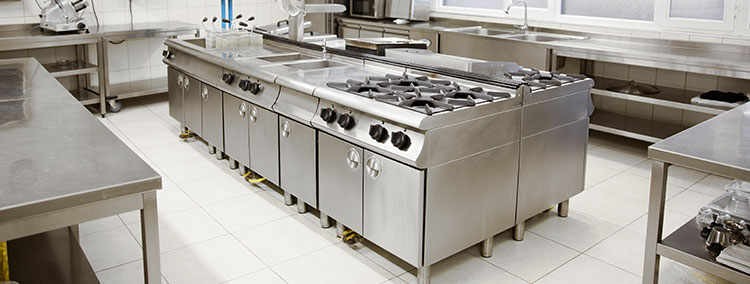
You have to take good care of your kitchen to prevent downtime and keep it functioning optimally and efficiently. How do you take care of your commercial kitchen? According to commercial appliance repair professionals, there are plenty of ways to do it. These ways include:
Clean the kitchen hood filter.
Kitchen hoods coated with oil and grime have reduced airflow, making them less effective in removing grease, smoke, and odor. They perform best when cleaned regularly.
After turning off the power to the machine and allowing it to cool, you should remove the grease traps, drain the grease, immerse the traps in a solution of water and degreaser, and air dry.
You should also remove the filters to soak and clean any debris obstructing airflow. This is also the time to check the filters for tears and damage to see whether they require replacing.
Next, clean the hood’s interior and exterior with the degreaser and water solution to remove built-up grease and caked-on residue. You also should wipe down all surfaces to keep the device safe for servicing and ready for peak performance.
Replace the gaskets in your kitchen.
Gaskets create a seal between two parts, preventing gases or fluids from escaping. They also help to reduce friction between parts, which increases component life and reduces vibration — potentially making the equipment safer to use.
You can find gaskets on virtually every connection point in your kitchen, including refrigerator or walk-in doors, sinks, faucets, drains, and stoves.
Because they are constructed of flexible materials, gaskets conform nicely to surfaces, forming a tight seal.
This softness also makes them some of the most worn elements in your kitchen, as they are prone to shifting, drying out, and breaking, making them a must-have on your commercial kitchen equipment maintenance list.
If you use a marinator, you may also have a gasket. Marinators use a tumbling mechanism to shorten the time required to marinate proteins from hours to minutes, or they can achieve the more intensive benefits of overnight marination in as little as 20 minutes by adding a vacuumed chamber to the process.
You should check the drum gasket regularly to ensure your marinator seals properly.
Replace the sifter brushes.
All Breader Blender Sifter (BBS) models employ a sifter brush as a drill, blending and mixing seasonings uniformly throughout the breading mixture to improve flavor consistency and eject undesired doughballs.
While this is the case, the bristles of a sifter brush can deteriorate over time, rendering them inefficient and wasting essential materials.
If you have a BBS, replacing your sifter brush is one of the most crucial commercial kitchen equipment maintenance jobs you can complete. Annual replacement maintains your BBS clean and efficient, extending the life of your breading combinations and lowering your ingredient expenses by up to 40%.
Clean or replace the kitchen casters
Commercial kitchen casters take a hammering as they regularly roll across your busy kitchen floor, accumulating dirt and grime and becoming prone to fracture and rust.
It’s simple to include a fast caster inspection in your operator’s weekly side work checklist to ensure the casters are debris-free and functional.
When it’s time for replacements, look into NSF-approved commercial kitchen casters, which are easier to clean and less likely to harbor hazardous bacteria than other casters.
Clean the deep fryers.
A simple lack of care and knowledge about cleaning and maintaining a deep-fat fryer may convert it into one of your kitchen’s most dangerous fire dangers.
You should have the fryer inspected by a skilled commercial kitchen equipment contractor every 12 months.
Clean the grease filters.
One of the simplest ways to prevent a grease fire in your commercial kitchen is to clean your grease filters regularly.
Most restaurant kitchens clean their grease filters once every week. If your restaurant prepares many oily foods, you may need to perform this service more frequently, if not nightly, which is an ideal strategy to lessen fire dangers.
Cleaning your grease filters regularly also helps to reduce the quantity of debris you have to clean off your restaurant’s kitchen equipment.
Replace the broken parts fast.
Many kitchen owners ignore a broken or faulty part on one of their appliances and continue to use that part to avoid bearing the cost of a repair. This is wrong.
The best way to go about it is to repair the broken element of the appliance right away rather than waiting. You can avoid the more expensive replacement by remaining on top of your repairs.
The longer you wait to repair parts, the more likely it is that additional sections of the appliance may fail, resulting in the complete appliance becoming non-functional due to carelessness.
Keep the floor in top shape.
Most businesses do not consider their kitchen floor part of their equipment, although it is the most commonly utilized section of the kitchen.
Negligence in cleaning the kitchen floor can result in your employee tripping or falling on the floor, which can reduce productivity and even lead to lawsuits.
To stay on the safe side, clean your floor regularly. You also should repair any faulty part as soon as you notice it.
Commercial appliance cleaning best practices
You must observe a set of best practices for the best outcome when cleaning your commercial appliance. These practices include:
Have a cleaning schedule.
A good cleaning routine guarantees you remove oil, stains, and food from your commercial kitchen equipment and appliances, producing superior-quality food.
Regular cleaning will keep your employees and customers in good shape, creating a safe and healthy working environment.
To achieve the greatest results, ensure that anyone cleaning your equipment follows the cleaning procedures outlined in the manual.
You should ensure that a professional appliance repair technician Fairfax cleans and repairs the kitchen. The last thing you want is to hire someone that causes more harm than was there.
The post How to Maintain Your Commercial Kitchen first appeared on HVAC Repair, appliance repair. The post appeared first on Express Appliance Repair